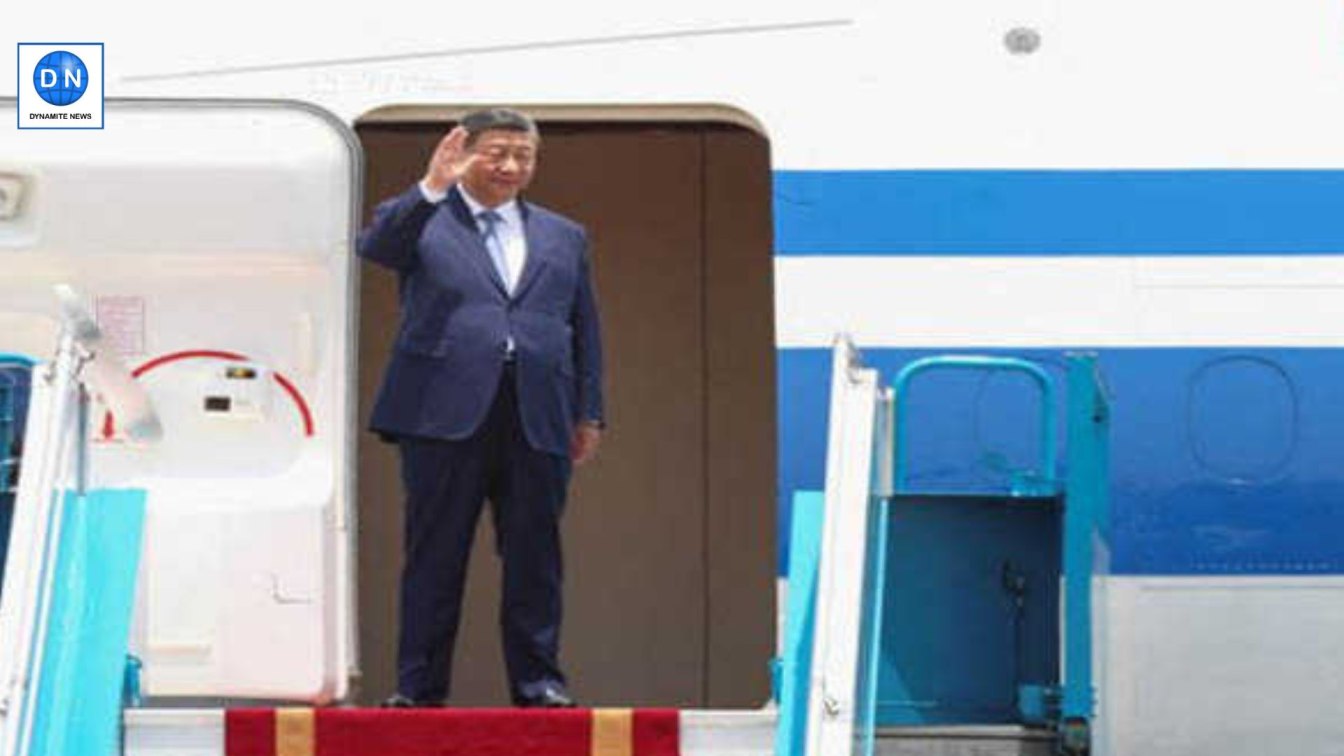
Beijing: Amid its ongoing trade war with the United States, Chinese President Xi Jinping landed in Vietnam today in what is his first overseas trip of the year to cement trade relations with the neighbouring country, and forge stronger strategic ties with Southeast Asia.
“I look forward to using this visit as an opportunity to have an in-depth exchange of views with Vietnamese leaders on the overall, strategic and directional issues of relations between the two parties and the two countries, as well as international and regional issues of common concern,” Xi said in prepared remarks soon after his arrival, according to South China Morning Post.
Landing in Hanoi, the Chinese President was greeted by senior officials of the Vietnam Politburo, including the Vietnamese President Luong Cuong.
For his trip, Xi was accompanied by Cai Qi, his chief of staff who ranks No 5 in the Chinese Politburo, as well as Public Security Minister Wang Xiaohong, and Foreign Minister Wang Yi, according to the Chinese state news agency Xinhua. Defence Minister Dong Jun and Commerce Minister Wang Wentao were also in the Chinese delegation, according to the Vietnam News Agency, as per SCP.
In a barb at the Trump administration over its tariffs, President Xi said “Our two countries should resolutely safeguard the multilateral trading system, stable global industrial and supply chains, and open and cooperative international environment.”
Xi, who last visited Vietnam 18 months ago will later visit Cambodia and Malaysia, as part of China’s quest to forge stronger ties with Southeast Asia to counter the effects of its trade war with the US.
The Chinese President’s visit comes at a particularly crucial time, as several Southeast Asian nations such as Vietnam and Cambodia have been hit with particularly high tariffs, with the 90-day respite only creating further anxiety among all the countries.
Also Read |
Other countries might "take similar measures" against US companies: China on TikTok
Vietnam, which is a major economic player right now, is facing a 46% tariff rate in its export duties to the US. The country is also a major maritime route for the shipping of Chinese goods to Washington.
In an article published on Monday in Nhan Dan, the official newspaper of Vietnam’s Communist Party, Xi called for greater collaboration among developing countries to promote “an equal and orderly multipolar world”.
“Together with the vast majority of countries of the Global South, we will defend the common interests of developing countries,” Xi said in the article. “There are no winners in trade and tariff wars, and there is no way out of protectionism,” he added.
Xi also stressed the “common ideals, beliefs and extensive strategic interests” of the two nations, adding that “deep mutual political trust” had driven close interactions between Beijing and Hanoi across a range of areas, including border security, cross-border law enforcement, foreign policy and national defence.
“On many international and regional issues, China and Vietnam share similar positions and work closely together,” Xi said.
In a separate piece published on Monday, General Secretary To Lam, Vietnam’s leader and chairman of the ruling Communist Party, said his country would promote three rail links with China as the “highest priority” in strategic infrastructure cooperation with Beijing.
“Maintaining strategic communication and enhancing political mutual trust are the most important issues and are the premise of the successful implementation of bilateral cooperation and agreement,” he wrote, adding that the two sides should strengthen cooperation in foreign policy, defence and security.
Also Read |
US President Trump says US is ready to act alone on North Korea
Vietnam, a rising manufacturing powerhouse, has seen a surge in Chinese investments in recent years as manufacturers move supply chains out of China to take advantage of lower labour costs and hedge against US levies.
China’s trade with Vietnam nearly doubled between 2017 and 2024, making the communist state China’s biggest trade partner in Southeast Asia, according to CNN.
During Xi's Hanoi visit, the two countries are set to sign about 40 agreements across multiple sectors – including cooperation on railways, agricultural trade and the digital and green economy, Vietnam’s Deputy Prime Minister Bui Thanh Son said on Saturday.
Despite their growing closeness, Vietnam and China have a tense relationship due to border issues, ever since the latter claimed ownership of almost the entire South China Sea, and even began identifying some Vietnamese maritime territories as its own.
In February, Chinese warships held live-fire drills in the waters near Vietnam in the Gulf of Tonkin, known as the Beibu Gulf in China, after Hanoi published a map defining its territorial claims there. While the two sides are trying to settle things amicably, the solution to these problems has not appeared yet, making the bilateral relations somewhat thorny.
In his signed article in Vietnam’s Nhan Dan Newspaper, Xi urged the two countries to “properly manage differences and safeguard peace and stability in our region".
“The successful delimitation of our boundaries on land and in the Beibu Gulf demonstrates that with vision, we are fully capable of properly settling maritime issues through consultation and negotiation,” Xi was quoted as writing.







